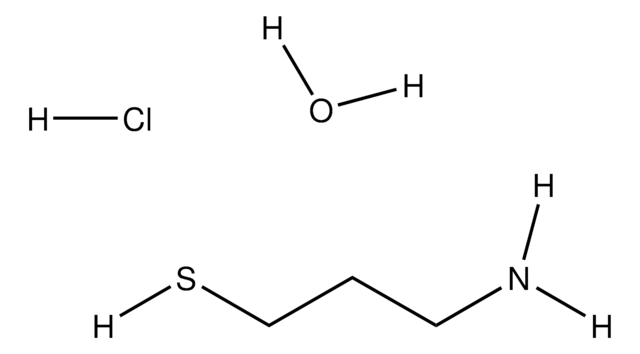M9768
Cysteamine
~95%
Synonym(s):
β-Mercaptoethylamine, 2-Aminoethanethiol, 2-Mercaptoethylamine, Decarboxycysteine, MEA, Thioethanolamine
Sign Into View Organizational & Contract Pricing
All Photos(1)
About This Item
Linear Formula:
NH2CH2CH2SH
CAS Number:
Molecular Weight:
77.15
Beilstein:
635649
EC Number:
MDL number:
UNSPSC Code:
12352100
PubChem Substance ID:
NACRES:
NA.22
Recommended Products
Assay
~95%
form
solid
storage temp.
2-8°C
SMILES string
NCCS
InChI
1S/C2H7NS/c3-1-2-4/h4H,1-3H2
InChI key
UFULAYFCSOUIOV-UHFFFAOYSA-N
Looking for similar products? Visit Product Comparison Guide
Application
Cysteamine is an amino thiol drug mainly used in the treatment of cystinosis. It is an antioxidant with chemo-sensitizing and radioprotective properties.
related product
Product No.
Description
Pricing
Signal Word
Warning
Hazard Statements
Precautionary Statements
Hazard Classifications
Acute Tox. 4 Oral - Eye Irrit. 2 - Skin Irrit. 2 - STOT SE 3
Target Organs
Respiratory system
Storage Class Code
11 - Combustible Solids
WGK
WGK 3
Flash Point(F)
Not applicable
Flash Point(C)
Not applicable
Personal Protective Equipment
dust mask type N95 (US), Eyeshields, Gloves
Choose from one of the most recent versions:
Already Own This Product?
Find documentation for the products that you have recently purchased in the Document Library.
Customers Also Viewed
Francesca Malvano et al.
Sensors (Basel, Switzerland), 18(7) (2018-07-07)
In this work, the development of an impedimetric label-free immunosensor for the detection of Escherichia coli O157:H7 is reported. Different immobilization techniques of monoclonal anti-E. coli were tested, in order to reach the very low limit of detections. The comparison
Dandan Fang et al.
Mikrochimica acta, 186(9), 608-608 (2019-08-09)
An ultrasensitive competitive-type electrochemiluminescence immunoassay for the mycotoxin zearalenone is described. The method is based on the use of (a) a mimotope peptide that was selected from a phage displayed peptide library and used to substitute ZEN for designing the
Ravendra Naidoo et al.
Bacteriophage, 2(1), 15-24 (2012-06-06)
Bacteriophages offer interesting alternatives to antibodies for the specific capture and detection of pathogenic bacteria onto biosensing surfaces. Procedures for the optimal chemical immobilization of lytic bacteriophages onto surfaces are presented. More specifically, the removal of lysate contaminants from bacteriophage
Natalia Canel et al.
Cell division, 7(1), 23-23 (2012-11-24)
Microcell-mediated chromosome transfer (MMCT) was developed to introduce a low number of chromosomes into a host cell. We have designed a novel technique combining part of MMCT with somatic cell nuclear transfer, which consists of injecting a somatic micronucleus into
Cysteamine suppresses invasion, metastasis and prolongs survival by inhibiting matrix metalloproteinases in a mouse model of human pancreatic cancer.
Fujisawa T, et al.
PLoS ONE, 7(4), e34437-e34437 (2012)
Our team of scientists has experience in all areas of research including Life Science, Material Science, Chemical Synthesis, Chromatography, Analytical and many others.
Contact Technical Service










